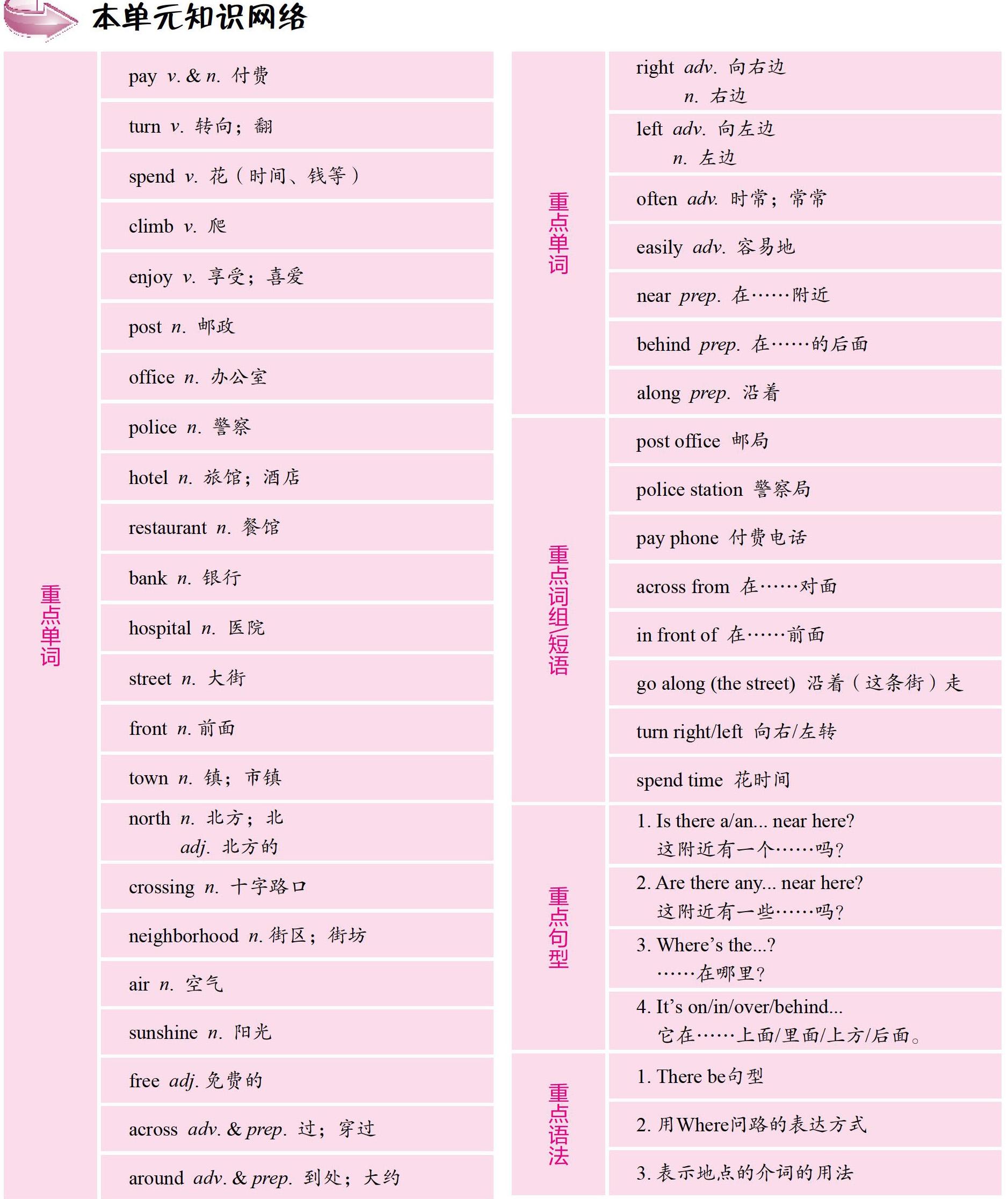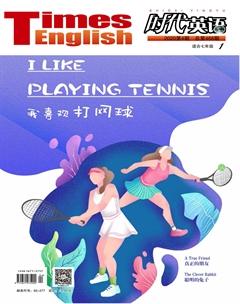Unit 8 Is there a post office near here?

Section A
1. Is there a hospital near here?
这附近有医院吗?
这是一个there be结构的一般疑问句形式。其肯定句型为“There be + sb/sth + 地点”,表示“某地有某人或某物”(there是引导词没有词义;be 是谓语动词;某人/物是主语;地点作状语,多为介词短语)。
There is a bank in the neighborhood.
附近有一家银行。
2. The pay phone is across from the library.
付费电话在图书馆对面。
across from是方位介词短语,意为“在……对面”。常见的方位介词短语有:next to 在……旁边,between... and... 在……和……之间,in front of 在……前面,in the front of 在……的前部。
3. Oh... wheres Center Street?
噢……中央街在哪里?
where是特殊疑问词,含有“哪里,某地”的意思,一般用来询问地点。where引导疑问句时,主谓要求倒装,且助动词必须与后面的主语保持一致。
—Wheres the park?
公园在哪里?
—Its on Center Street.
它在中央街。
—Where are the books?
书在哪里?
—They are on the desk.
它们在桌上。
—Where do you live?
你住在哪里?
—I live in Changsha.
我住在长沙。
—Where does he live?
他住在哪里?
—He lives in Mexico City.
他住在墨西哥市。
GRAMMAR FOCUS
There be句型
(1)There be结构表示“某地有某物或某人”。其基本句型為“There be + 某物或某人 + 某地”。
(2)there be句型的谓语动词be在人称和数上应与后面的第一个名词保持一致。如果后面的名词是可数名词单数或不可数名词,谓语动词用is;如果后面的名词是可数名词复数,be 动词用are。
There is a boy and two girls in the room.
房间里有一个男孩和两个女孩。
There is some salad on the table.
桌上有一些沙拉。
There are some students in the classroom.
教室里有几个学生。
(3)There be句型的否定句是在be动词后加not。
There isnt a post office near here.
这周围没有邮局。
(4)there be句型的一般疑问句是将be动词提到句首。肯定回答:Yes, there is/are;否定回答:No, there isnt/arent。
—Is there a bank near here?
这附近有银行吗?
—Yes, there is. / No, there isnt.
是的,有。/ 不,没有。
表示方位的单词、短语
(1)behind 在……后面
There is a cat behind the door.
门后面有只猫。
(2)on the left/right 在左/右边
Who is sitting on your right?
谁正坐在你的右边?
(3)next to... 在……旁边,紧挨着……
The bank is next to the library.
银行在图书馆旁边。
(4)in front of... / in the front of... 在……前面/在……前部
He is in front of the restaurant.
他在餐馆前面。(餐馆外)
He is in the front of the classroom.
他在教室前面。(教室内)
(5)between... and... 在……和……之间
The garden is between a school and a store.
花园在学校和商店之间。
(6)across from... 在……的对面
There is a school just across from our house.
有一所学校就在我们家对面。
活学活用
单项选择。
( ) 1. The supermarket is ___ the left.
A. in B. at
C. on D. from
( ) 2. Can you tell me how to get ___ there?
A. at B. in
C. / D. to
( ) 3. He sits between Li Ping ___ Wang Hai.
A. and B. but
C. or D. from
( ) 4. —___ is your book?
—It is on the desk.
A. What B. How
C. Where D. What
( ) 5. ___ there a bank near here?
A. Does B. Is
C. Are D. Do
Section B
1. Turn right at the first crossing and the restaurant
is on your left...
在第一个十字路口向右转,餐馆就在你左边……
(1)crossing n. 十字路口
turn left/right at the + 序数词 + crossing = take the + 序数词 + crossing on the left/right,意为“在第几个十字路口向左/右转”。
Turn left at the second crossing.
= Take the second crossing on the left.
在第二个十字路口向左转。
(2)on ones left 在某人的左边;on ones right 在某人的右边。
Zhang Feng is sitting on my left.
张峰坐在我的左边。
2. There is a zoo in my neighborhood.
我家附近有一个动物园。
“在附近”可以用near here,around here和in ones neighborhood来表示。
Is there a post office near here?
= Is there a post office around here?
= Is there a post office in your neighborhood?
這附近有邮局吗?
3. To get there, I usually walk out and turn right on
Bridge Road. Then I walk along Bridge Road.
The zoo is on the right.
要去那儿(动物园)的话,我通常步行外出,在大桥路向右拐。然后我沿着大桥路直走,动物园就在右边了。
(1)这是英语行文的一种方式,即在句子的开头用To do... 短语,并用逗号将其与句子的主体部分隔开,相当于汉语“(若)要做……的话”。
To listen to world news, please key in “1”.
若要收听国际新闻,请输入“1”。
To get it right, you must think hard.
要想把它做对,你必须得认真思考。
(2)turn right表示“向右转”,“向左转”则是turn left;walk along表示“沿着……路走”,而表示“直走”的话可以用go/walk straight。
4. The best things in life are free!
生活中最美好的东西是免费的!
free adj. 免费的;有空的,空闲的
You can take this book with you—its free!
你可以拿走这本书——它是免费的!
Are you free tomorrow? I want you to come to my birthday party.
你明天有空吗?我想你来参加我的生日聚会。
5. It is very quiet and I enjoy reading there.
那里很安静,我喜欢在那里看书。
enjoy v. 喜欢,欣赏,享受……的乐趣
Thanks for the great evening. I really enjoy it.
感谢这美好的夜晚。我真的玩得很开心。
enjoy的相关用法及短语:
(1)enjoy doing sth 喜欢做某事
I enjoy watching TV.
我喜欢看电视。
(2)enjoy oneself = have a good time 过得快乐,玩得开心
They all enjoy themselves at the party.
= They all have a good time at the party.
他们在聚会上都玩得非常高兴。
(3)过愉快些;好好欣赏(祝愿时说)
Heres a book for you. Enjoy!
给你一本书。好好欣赏吧!
活学活用
完成译句。
6. 我们学校后面有一条河。
____ ____ a ____ ____ our school.
7. 公园和邮局之间有路吗?
____ ____ a road ____ the park ____ the post office?
8. 那个公园是个散步的好去处。
The park is a good place ____ ____ ____
____ ____ .
9. 不要乘出租车了,我们要经过三条单行道。
____ ____ a taxi. We will ____ ____ three one-way streets.
10. 希望你们旅途愉快。
I hope you will ____ ____ ____ ____ .
单项选择
( ) 1. Can you swim ___ the river?
A. near B. between
C. from D. across
( ) 2. ___ , where is the park?
A. Hi B. Hello
C. Excuse me D. Excuse
( ) 3. Just go along the street and turn ___ . The school is ___ .
A. left; left B. left; to the left
C. on the left; left D. left; on the left
( ) 4. —Is there a library in your school?
—___ .
A. No, there isnt B. No, it isnt
C. Yes, there isnt D. No, there is
( ) 5. There isnt a restaurant ___ here.
A. in B. near
C. from D. on
单词拼写
1. People can visit the park for f______.
2. Is there a p______ phone near here? I want to call my father.
3. Hebei is in the n______of China.
4. Please turn right at the first c______.
5. On Lilys left I see an English boy, and on her r______ I see an American girl.
用所给词的适当形式填空
1. I think you can do it well______(easy).
2. I spend much time______(speak) English every morning.
3. There are two______(road) to our village.
4. The children enjoy______(play) soccer after class.
5. There are two______(bank) in the neighborhood.
按要求完成句子
1. There is a post office near the library.(对画线部分提问)
______ near the library?
2. There is a shop near the school.(改为一般疑问句)
______a shop near the school?
3. The school is across from the bank.(对画线部分提问)
______ the school?
4. There is a pen in my pencil case.(改为同义句)
I ______a pen in my pencil case.
5. Is there a baseball under the chair?(作肯定回答)
______ ,______ .
6. 邮局在旅馆的后面。(完成译句)
The post office is______the______.
7. 我爸爸花很多时间跟我一起读书。(完成译句)
My dad ______ lots of time______ with me.
8. 医院紧挨着公园。(完成译句)
The hospital is ______the park.
9. there, a, near, cinema, is, house, your(連词成句)
____________?
10. right, the, at, second, turn, crossing(连词成句)
____________.
补全对话
A: Sam, I want to go out to play basketball. Would you like to go with me?
B:______ 1 Just wait for one minute.
A: Whats the matter?
B: ______ 2 How can we play basketball in the rain?
A: Right.______3
B: Going to the movies?But we still need to go out.
A:______ 4
B: I think the TV show is so boring. Lets cook a nice meal at home. There is a lot of food in the fridge.
A:______ 5 Lets begin.
A. It is raining.
B. Yes, Id love to.
C. That sounds good.
D. What about going to the movies?
E. Then what about watching TV at home?
1. ______ 2. ______ 3. ______ 4. ______ 5.______
阅读理解
A
Dear Blaire,
How are you? I have a good time living in my new neighborhood. Here is a sports center in it. Its just in front of our house, so I often goes there to swim. There is also a park in my neighborhood. Its not far from my school. I like to spend time there with my friends after school. But my favorite place is the zoo. To get here, I usually ride my bike for ten minutes.
On Friday evening, my parents and I usually eat out. There are three restaurants near my home. Mr Greens Restaurant is our favorite. Mr Green is always friendly. The food is cheap and delicious. Lots of people like to have dinner there.
Can you come to see me when youre free? Ill show you around my neighborhood.
Yours,
Michael
( ) 1. The sports center is ___ Michaels house.
A. in front of B. behind
C. across from D. next to
( ) 2. Where does Michael like to go after school?
A. The zoo. B. The library.
C. The park. D. The supermarket.
( ) 3. How does Michael go to the zoo?
A. By bus. B. By car.
C. By bike. D. On foot.
( ) 4. The word “cheap” means “___” in Chinese.
A. 糟糕的 B. 便宜的
C. 浪费的 D. 昂贵的
( ) 5. Michael writes to Blaire to tell her about his ___ .
A. free time B. school life
C. favorite place D. new neighborhood
B
Mr Brown lives on Green Street now. He wants to send a postcard (寄賀卡) to his pen pal in Toronto, but he doesnt know where the post office is. “Which is the way to the post office?” he asks his new neighbor Joe. “I want to send a postcard to Toronto.” “The post office is on the Center Street. Its quite far from here,” answers Joe. “If you only want to post some letters or postcards, you neednt go to the post office. You can put them into a mailbox down the street.”

